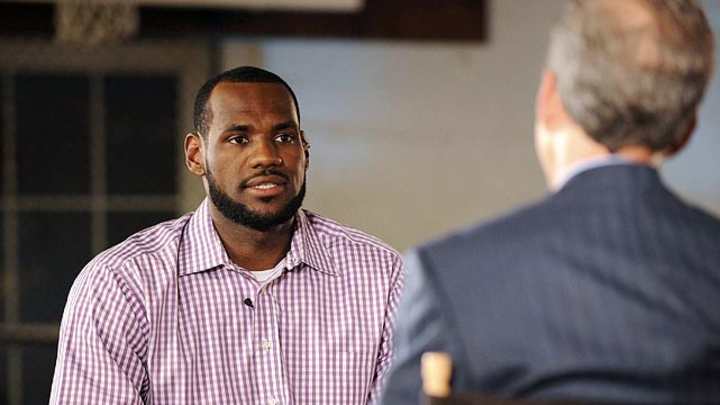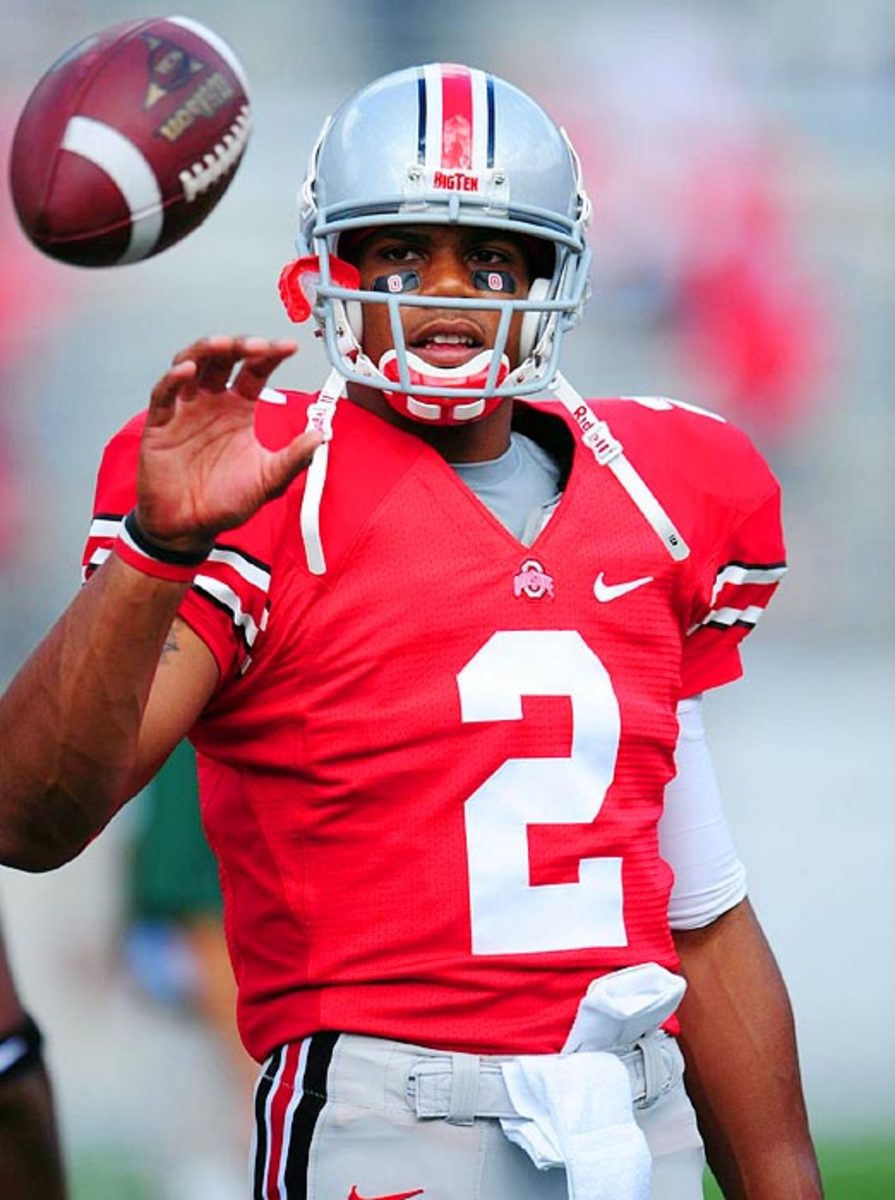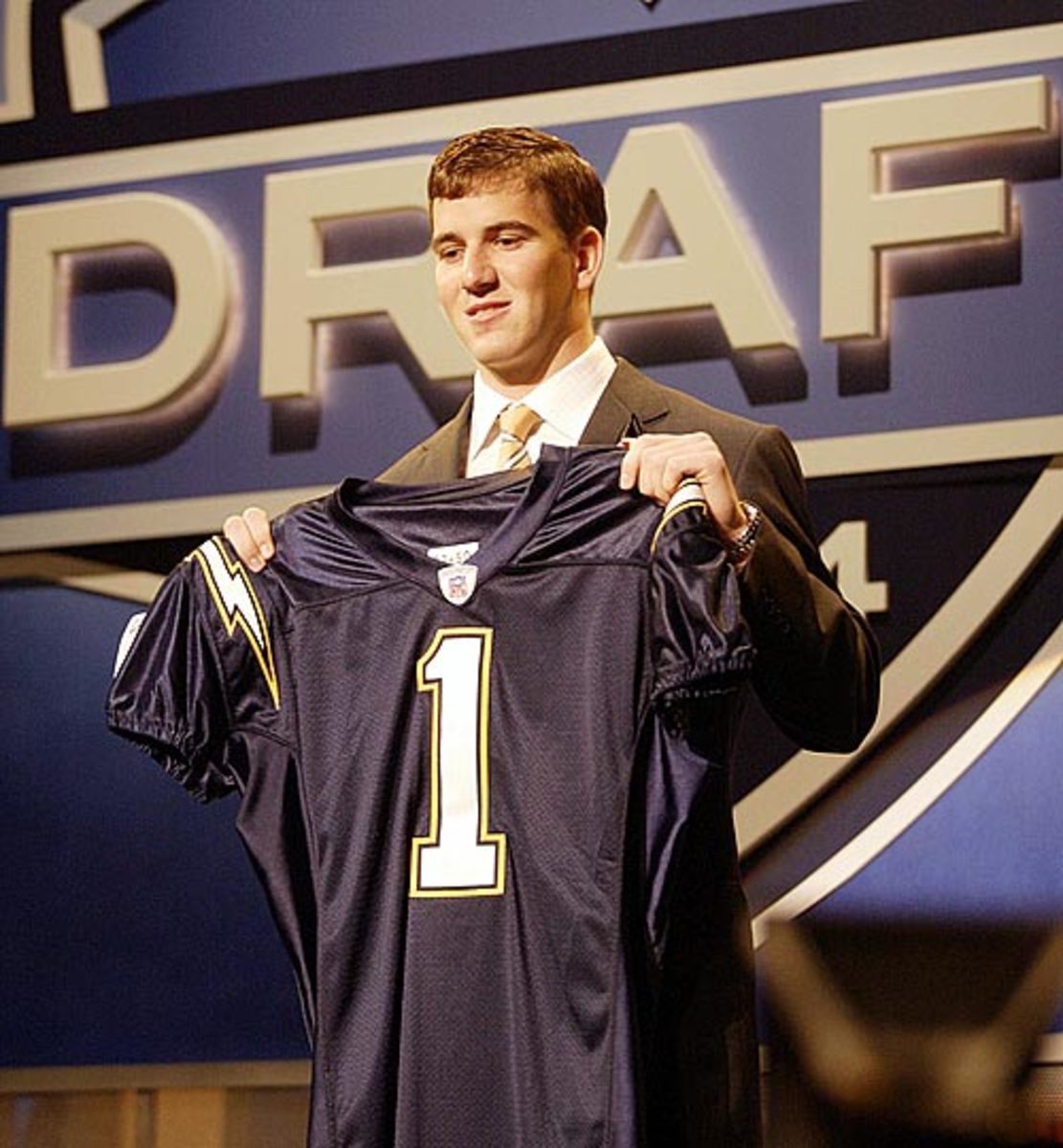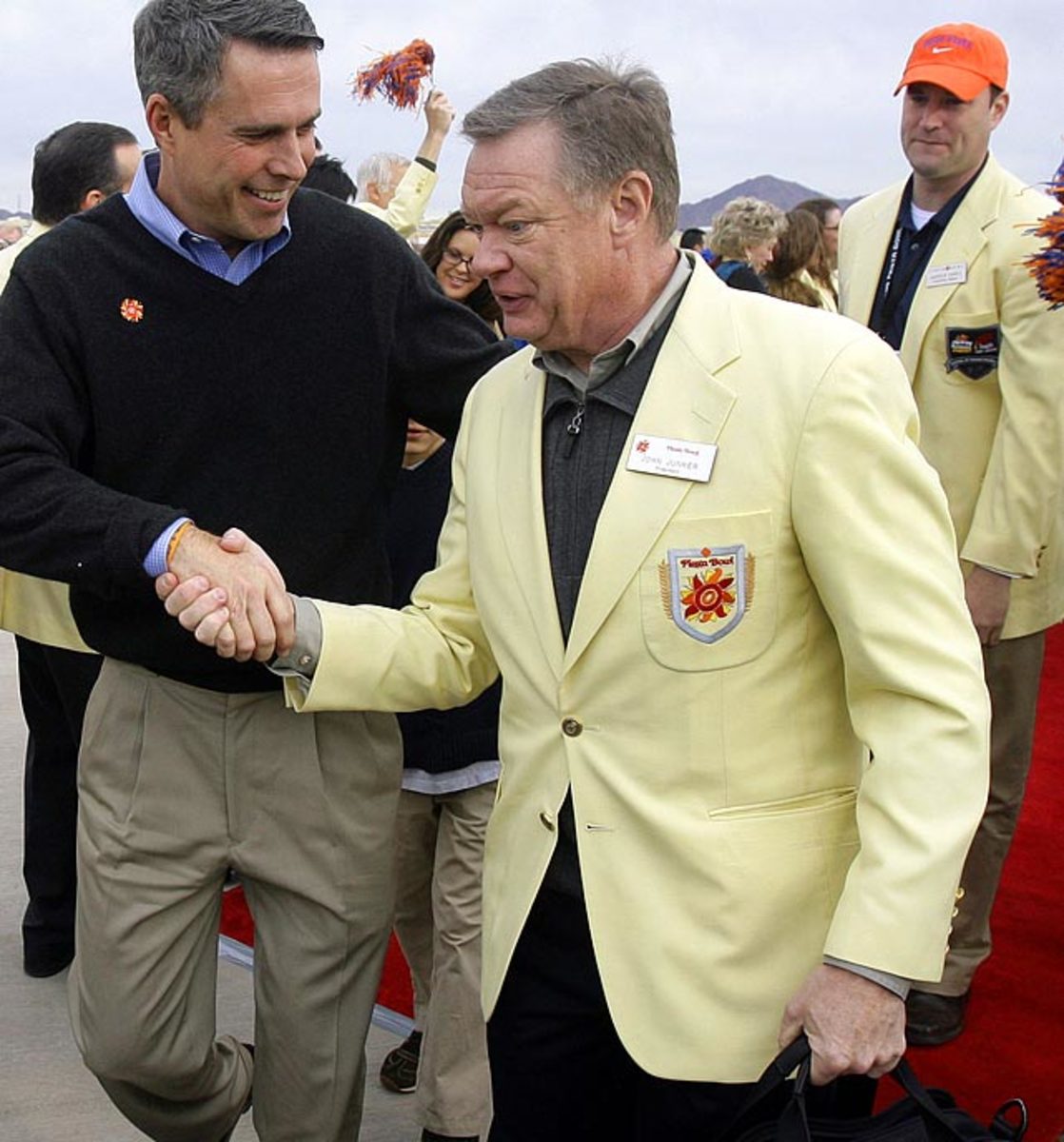Persona Non Grata

Persona Non Grata
LeBron James (Cleveland)

Ohio natives aren't about to welcome LeBron James and Terrelle Pryor back with open arms, and those two aren't alone in being unwelcome in their old stomping grounds. From athletes who took bigger paychecks to sign for a hated rival, to owners who moved beloved franchises to other cities, SI.com presents the persona non grata club, starting with James. Nearly 10 million people watched the 2010 television special The Decision , in which LeBron quashed the hopes of Cleveland fans by choosing the Miami Heat as his new team. Many Cavs fans felt vindicated when LeBron's Heat lost in the NBA Finals to the Dallas Mavericks. Who would you add to the list? Send comments to siwriters@simail.com.
Reggie Bush (USC)

While at USC, Reggie Bush was adored by Trojans fans as one of the fastest and most exciting players to ever wear the cardinal and gold. But an NCAA investigation into alleged rampant corruption in the USC program -- especially in terms of gifts Bush had received -- led to a two-year bowl ban and other penalties in 2010 and the BCS stripping USC of its 2004 national title in 2011. Bush voluntarily gave back his 2005 Heisman.
Terrelle Pryor (Ohio State)

After he received a five-game suspension at the end of the 2010 season for receiving improper benefits, Ohio State quarterback Terrelle Pryor pledged he would return for the second half of his senior season. Given the unflattering attention he -- and his cars -- brought to the university, many Buckeyes fans weren't sad to see him renege on his promise in June 2011 and announce he would leave Columbus for the NFL. In late July, the school banned him from any contact with the athletic program for the next five years.
Lane Kiffin (Tennessee)

Lane Kiffin signed a four-year contract with Tennesseeto be the head coach of the football team. He only lasted one. After Kiffin announced in 2009 that he would take the coaching job at USC, Tennessee students rioted on campus, lighting mattresses and trash on fire.
Kevin Love (Oregon)

Beloved in his home state of Oregon, Kevin Love became public enemy number one when he chose in 2007 to play for UCLA instead of Oregon, his father's alma mater. During Love's time as a Bruin, he received death threats on his cell phone and his family was pelted by objects when they watched him play in Eugene.
Eli Manning (San Diego)

In the weeks leading up to the 2004 draft, quarterback Eli Manning said he would refuse to play for the San Diego Chargers if they drafted him with the first overall pick. The Chargers drafted him first, but only after they had a deal in place to trade him to the Giants for New York's fourth overall pick. While they may still hate Manning, Chargers fans can take solace in the fact that they received Philip Rivers (and later drafted Shawne Merriman and Nate Kaeding) in exchange for Manning.
Eric Lindros (Quebec)

He was drafted first overall by the Quebec Nordiques in 1991 but refused to play for a losing team in the NHL's smallest market -- he even refused to put on their sweater during his Draft Day introduction -- thereby enraging the city as well as the entire province. The highly-touted Lindros, dubbed "The Next One", turned down a 10-year, $50 million offer saying he didn't believe the Nordiques wanted to win the Stanley Cup and sat out the 1991-92 season while forcing Quebec to trade him to the Philadelphia Flyers for Peter Forsberg, Ron Hextall, Mike Ricci, Chris Simon, Kerry Huffman, Steve Duchesne, two first-round picks, and $15 million. The trade ultimately built a Stanley Cup champion, but by that time, the Nordiques had moved to Colorado.
Art Modell (Cleveland)

It has been more than 15 years since Cleveland Browns owner Art Modell announced that he was moving the franchise to Baltimore, but the hatred Clevelanders still hold for Modell is possibly matched only by their feelings about LeBron James.
Isiah Thomas (New York)

Isiah Thomas was seen as the face of the Knicks as the franchise became a national laughingstock in the mid-2000's for its skyrocketing payroll and disappointing results. Thomas' move to head coach of the team was equally unsuccessful, and -- much to the New York fans' liking -- Thomas was fired in 2008.
Steve Bartman (Chicago)

On Oct, 14, 2003, the Chicago Cubs were leading the Florida Marlins 3-0 and were five outs away from their first World Series appearance since 1945. With Luis Castillo at the plate, Steve Bartman, a Cubs fan sitting along the left field line of Wrigley Field, interfered with -- and some say prevented -- Cubs outfielder Moises Alou from catching a foul ball. Castillo went on to walk and the Marlins would score eight runs in the inning to win 8-3. The next night, the Cubs lost Game 7 and were eliminated from the NLCS. In the aftermath, Bartman received death threats and had police officers stationed outside his house.
Chris Webber (Michigan)

In his two years at Michigan, Chris Webber led the basketball program to great heights, but also to great lows. With Webber, the Wolverines made the NCAA championship game in 1992 and '93, but both seasons' accomplishments were vacated after a scandal involving Webber and others with booster Ed Martin. Webber was indicted for perjury in 2002 and is banned from associating with the program until 2013.
Alex Rodriguez (Seattle)

With the losses of Randy Johnson and Ken Griffey Jr. still fresh in Seattle fans' memories, Alex Rodriguez's move to Texas in 1999 -- and the fact that he signed what at the time was the biggest contract in baseball history -- did not go down well with the Mariners' fans. They're still known to pepper the third baseman with more boos than he is usually accustomed to hearing.
Johnny Damon (Boston)

In 2004 with the Red Sox, the bearded Johnny Damon was the posterboy of the World Series-winning "Idiots." Two years later, Damon was shaved, wearing the Yankees' pinstripes, and one of the most hated players in Boston.
Marian Hossa (Pittsburgh)

One of the stars of the 2008 Pittsburgh Penguins, Marian Hossa left the Penguins after that season for the Detroit Red Wings, the team that had defeated Pittsburgh in the Stanley Cup finals. Penguins fans got their revenge in 2009 when Pittsburgh defeated Hossa's team in the Stanley Cup finals.
Clay Bennett (Seattle)

Clay Bennett and the rest of the ownership group that owned the Seattle SuperSonics wanted to move the franchise to Oklahoma City, much the chagrin of the NBA team's loyal fans. After many legal obstacles, Bennett and Co. got their wish in 2008. They paid the city $45 million in damages and left Seattle fans without a team.
Nick Saban (LSU and Miami)

LSU fans were hurt when head coach Nick Saban left for a high-paying job in the NFL. Dolphins fans jumped on the anti-Saban bandwagon in 2007, when, after a 6-10 season, he jumped ship for the Alabama Crimson Tide job, even though he had repeatedly denied rumors that he would do so.
Bobby Petrino (Atlanta)

Everything went wrong for the Falcons in 2007. Star quarterback Michael Vick was sentenced to 23 months in prison for financing a dogfighting ring, and the team started 3-10. Head coach Bobby Petrino drew the ire of Atlanta fans when he quit after the 10th loss of the season and signed a five-year deal with the Arkansas Razorbacks.
John Junker (Arizona)

The former CEO of the Fiesta Bowl, John Junker was disgraced after it was revealed he had misused company expenditures and coerced employees into making donations to select politicians. After a 2011 investigation, Junker was fired. Luckily for the Arizona economy, the BCS has allowed the Fiesta Bowl to maintain its place in the prestigious bowl lineup.
Carl Pavano (New York)

In 2005, the Yankees gave Marlins pitcher Carl Pavano $40 million to sign with New York. In return, Pavano went 9-8 with a 5.00 ERA in his three injury-plagued seasons, earning the nickname "The American Idle."
Carlos Boozer (Cleveland)

Before LeBron James in Cleveland, there was Carlos Boozer in 2004. Despite the Cavaliers' claim that Boozer had made a verbal commitment to re-sign with the team, he signed with the Utah Jazz, who made a bigger offer. His departure was met by criticism from then-Cavaliers owner Gordon Gund, who said, "In the final analysis, I decided to trust Carlos and show him the respect he asked for. He did not show that trust and respect in return."
Roger Clemens (Boston)

Boston fans were already angry with Roger Clemens after he left the Red Sox for their AL East opponents, the Toronto Blue Jays. But Clemens twisted the knife in the wound when he was traded to the hated New York Yankees two years later.
J.D. Drew (Philadelphia)

Philadelphia fans are known for being especially ruthless. But few are on the receiving end of quite as many boos as slugger J.D. Drew. Before the 1997 draft, Drew announced that he would not sign with a team that would not sign him for at least $10 million. Possibly thinking he was bluffing, the Phillies took him with the second overall pick. He wasn't. His financial demands not met, Drew spent the next year in the independent Northern League and signed with the Cardinals in 1998.
Peter Pocklington (Edmonton)

In one of the biggest trades in sports history, Oilers owner Peter Pocklington stunned Edmonton fans in 1988 when he announced he had traded national hero Wayne Gretzky to the Los Angeles Kings. Pocklington was burned in effigy and is still blamed by many fans for the move, even though he has claimed that it was vital for the financial well-being of the franchise.
Vince Carter (Toronto)

For years, Vince Carter's high-flying dunks were the face of the Toronto Raptors franchise. But Carter's departure from Toronto did not come as gracefully. Carter was traded to the Nets facing allegations of a lack of effort and of having tipped off the Sonics during the playoffs regarding the play the Raptors were about to run. Carter denied both, but didn't exactly ease things over with his former fans a month after the trade, when he admitted in a TV interview that he hadn't pushed himself when he was in Toronto.
Matt Millen (Detroit)

Matt Millen's seven-year tenure as CEO of the Detroit Lions was one of the least successful in NFL history. Under him, the team went 31-81 and had a number of its draft picks flop, causing the Detroit fans to turn on their team's de facto general manager. "Fire Millen" signs were held at sports games across the country, and multiple walkouts were held during Lions' games. Millen was eventually fired after the team started 0-3 in 2008.
Robert Irsay (Baltimore)

Perhaps no team's relocation has ever been as audacious as the move Baltimore Colts owner Robert Irsay pulled off in 1984. Fearful hat the city would try to claim the struggling franchise as eminent domain, Irsay had the team's possessions packed into moving vans in the middle of the night. By that morning, the team was in Indianapolis.
Walter O'Malley (New York)

In Los Angeles, Walter O'Malley was idolized as the Dodgers' owner -- the first man to bring Major League baseball to the west coast. Decades since the 1957 move from New York, Brooklynites still mourn the loss of "Dem Bums," the adored group of players that played at Ebbets Field.
